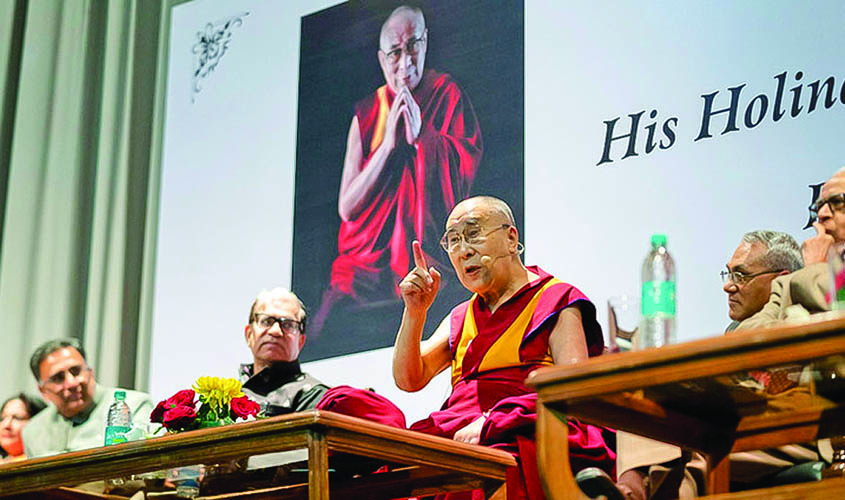“I would like to speak from here, only if you give me permission,” said the 14th Dalai Lama, Tenzin Gyatso, while addressing a gathering of around 200 people at Delhi’s Siri Fort Auditorium on 8 December. What he meant was that he would like to sit and talk rather than stand at the lectern. He then peered at the audience through his glass and added, “If you won’t give me permission, I would give to have to go like this…” Then he mimicked an old man’s walk and the crowd burst out laughing.
Dalai Lama was in Delhi to give the first memorial lecture in commemoration of the late Yuvraj Krishnan, the former Deputy Comptroller and Auditor General of India. The topic for the talk was “Ethics and Happiness”.
He spoke to a rapt audience about his escape from Tibet in 1959 after the attacks by the Chinese Army. He spoke in a deep voice and the overall manner of his speech made us feel that we are listening to a horror story. He then touched upon how India then became his home.
There were many comic moments in his speech which made you feel that you were listening to a relative who is sharing his experiences after coming from a long journey.
According to him, India is the only nation which can combine ancient knowledge and modern education together to create a balanced approach to life. He said, “As refugees, it is our moral responsibility to make a contribution to this country, so our life becomes more meaningful. We have learned so much from this country.”
He later explained the meaning of ethics. He said, “Ethics means doing something good to yourself and to the other. Any action which brings joy and happiness to others is ethical.”
He said that only a complete education which moves beyond the material pursuits of life is helpful in the all-round development of a person. He also added that, the media should attempt to run positive stories instead of focusing only on the sensational stuff.
“If one seriously believes that everyone is the son and daughter of the same father, there won’t be a problem,” he said. “One should seriously believe this that we are all brothers and sisters. We should think that the negative criticism is minor and temporary and even twins have some occasional problems.”
The most important lesson in life, he said, is that we must respect others live with humility: “I don’t discriminate between a Buddha and a non-Buddha, an Indian or a Tibetan. I never consider myself as the Dalai Lama. I never consider myself as ‘his highness’. I don’t think I am special. And therefore, wherever I go, whomever I meet, I easily mix with people.”
A member of the audience asked him how one should deal with grief caused by the loss of a loved one. In response, the Dalai Lama gave his own example: “When my teacher passed away, I felt very sad but I thought I must fulfil his wishes with enthusiasm and determination.”
He added, “We should analyse if we overcome a worrisome situation through our efforts or not. And if we can overcome it, there is no need to worry and if we can’t there is no use of worry.”

